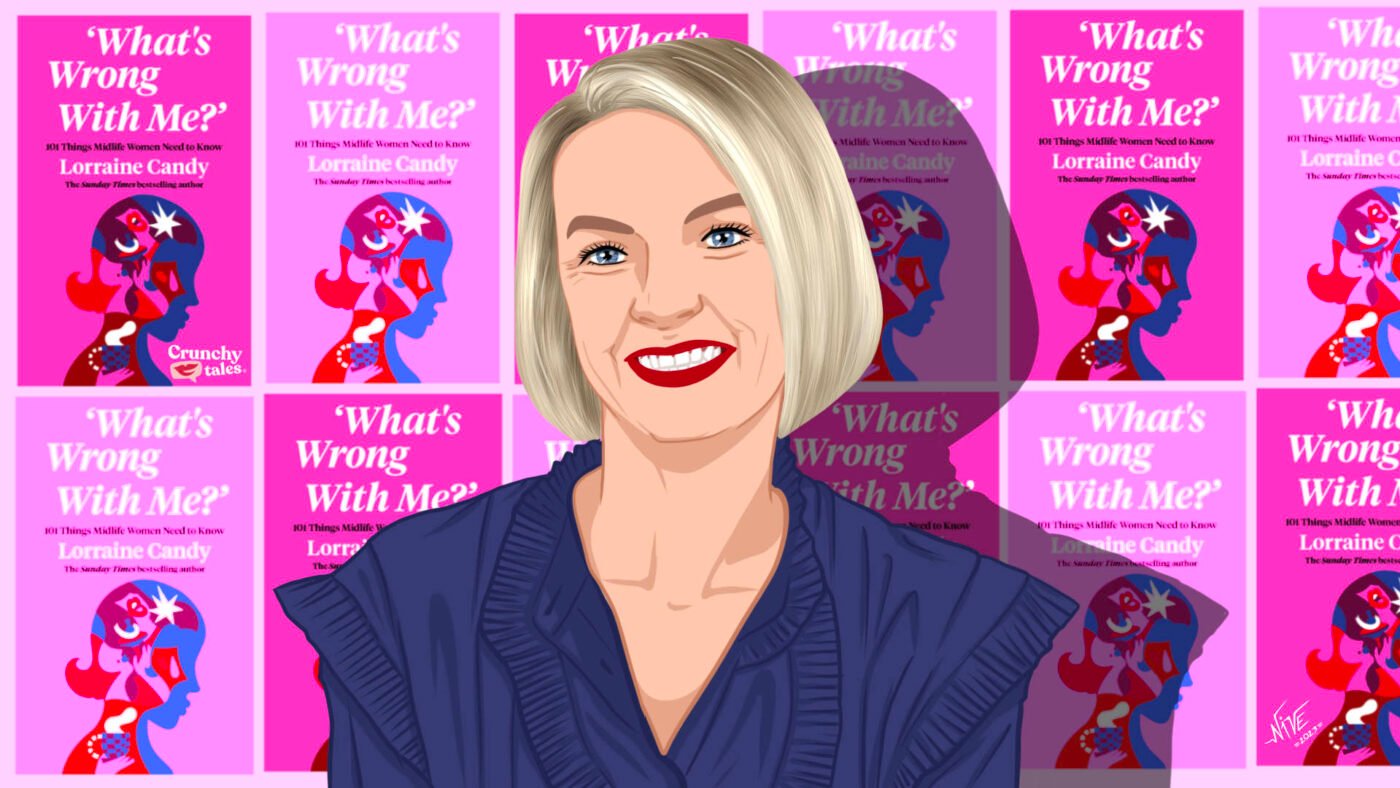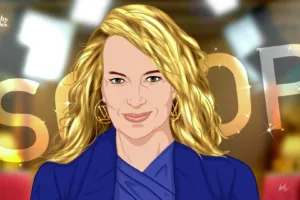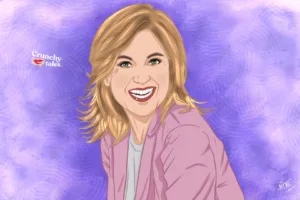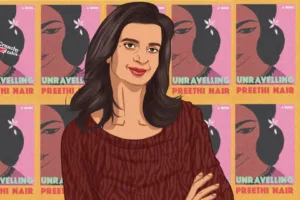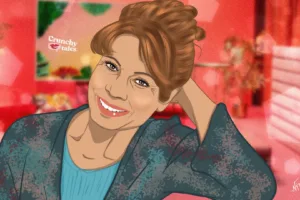Lorraine Candy: “I Faced The Midlife Void By Slowing Down”
Lorraine Candy, a mother of four, an award-winning journalist and former editor of popular magazines such as The Sunday Times Style, ELLE and Cosmopolitan, experienced a sudden unravelling in her life despite her amazing background and capabilities.
She found herself asking, “What’s wrong with me?” as she struggled with panic attacks. “If I was removed from the hurly-burly of these overwhelming days, I would be able to patiently and logically think it all through”, she says. “To untangle this conundrum. I would be able to find the thing I had lost. Probably the most important thing I owned. My identity.”
It was during her perimenopause and menopause that she realized she was not alone in these experiences. Feeling overwhelmed, Candy decided to share her journey and insights with other women. Her book, “What’s Wrong With Me? 101 Things Midlife Women Need to Know,” aims to provide support and guidance for women navigating the changes and challenges of midlife. Tackling everything from empty nest, career reinvention, sex, marriage, brain fog, burnout, perimenopause and menopause, this laugh-out-loud memoir is a pathfinder for women whose messy midlife rage caught them by surprise.
Lorraine, midlife is often seen as a time of crisis or stagnation, but your latest book and story remind us that it can be a time of immense personal growth and self-discovery. How did you reassess your priorities and face what you call “the void”?
Midlife is about feeling all the feelings. I learnt that I had to go through a reckoning of sorts, I had to sit with some uncomfortable feelings around my children leaving home (which I found unbearably sad), my career ending as a magazine editor and the realisation I was quite burnout and my habit of being manically busy was not serving me well. So I faced ‘the void‘ by slowing down. taking a bit of time out in the early mornings to do something for myself and also realising I could say No to things instead of constantly seeking validation through work. I came to terms with my body ageing and changing, and I started to value friendship a lot more. I rang my old friends more and I made new friends purposefully by engaging in new activities that were about personal time not work-orientated. I was very proactive about this and talked to women I met swimming outside or made the effort to really engage with women around me.
In your opinion, what are the most common misconceptions about ageing?
Society views women ageing dimly – we prize youth which is illogical because our experience means we have more to offer hopefully as we age as women. Older women can be more interesting and more positive about life because they value what they have and what time is left – the time left becomes really important to us! I think there is a gap between young and old which we don’t see represented in society so we are either youthful or grey-haired old ladies the in-between bit which is as joyous as the ageing bit gets lost culturally although now we are beginning to see more midlife role models for women. There is no need to do less as we age, more of a need to curate what we do so we have less manic stress in our lives. I am fitter and feel more energy now than I have done for years. This is in part due to HRT for sure but my mindset is one of being in control of my life and how I want to spend it. I have new energy to do new things too.
Throughout your memoir, you share a wealth of valuable lessons that you have learned along the way (as well as 101 things midlife women can do). In particular, you mention the importance of exploring new interests or trying new things. What did wild swimming bring to your life and how did you get into it?
I find open water swimming extremely meditative – no one can talk to you, no one can ask anything of you and the rhythmic sounds of the water is very calming. Also, I benefit hugely from the warm, midlife community around outdoor swimming which I have done for about 8 years now. I couldn’t swim front crawl when I took it up after injuring my knee running but I learnt and overcame my fear of the deep to enjoy something that feels like a mini adventure every time I do it. I have also taken up yoga – which I only discovered when I was writing a piece about what a waste of time I thought it was! I was wrong and I will happily try new things now in a more enthusiastic and less competitive way than I did before.
No journey is without its challenges, and your story is no exception. In your book, you recommend therapy to help us navigate our new roles in midlife and take the lid off the anger pot, too. Why do women feel so angry in this stage of life and how they can go from fury to feeling good?
The emotion rage is often linked to fear and midlife is a time of huge change for women which is frightening for some and also a time of overwhelming responsibilities (elderly parents, teens, job changes, ageing) so that can explain the new rage we feel. Also, we just don’t want to put up with things anymore as time is running out so that makes us cross: we have to find our voice around being angry, feel able to show it and say no to things which are not good for us. Gen X had been taught women don’t show rage so for some of us it is a new emotion. There is also a neurological component to this as estrogen dips in the brain as we age so for me HRT greatly reduced my rage because it boosted my estrogen. I still feel rage though because I just won’t put up with things from other people anymore that I consider detrimental to my health or that of my family. Also, I am quite cross with the patriarchy and all those men who didn’t step up to help working women out as they raised families – I get furious about inequality and I think it is healthy to voice that.
Perimenopause and menopause seem to be our worst enemies in midlife. How can we navigate these life transitions without losing the plot?
All women are going to go through this so it is a natural stage of life – it isn’t a nightmare it is more the lack of education and knowledge around it that is the nightmare. If we know what we may face and what is going on with our hormones we can seek the individual support we may need to enjoy our lives more and feel healthier and happier. Every woman is different so each of us needs a different kind of support. But we do need to talk about it in society and we do need to make sure ALL women get what they need. I have spoken to women whose perimenopause symptoms were so bad they were prepared to take their own lives so for me it is about making sure we don’t deny the experiences of women who need our help. My advice is to educate yourselves (I found the work of Dr Louise Newson and Dr Naomi Potter particularly helpful) and then seek help from your GP if you need it and also make the lifestyle changes which give you the space to enjoy ageing – find out what makes you sleep well as sleep is the key to alleviating many symptoms.
During this stage of life, our relationships often undergo significant changes. In your book, you emphasize the importance of surrounding ourselves with supportive and positive individuals who uplift us and encourage our growth. How do you think can we cultivate new meaningful connections in midlife?
I think we have to seek out social connections: join groups, take up hobbies, and engage with people at work on a deeper level. Nourish your long-standing friendships and treat people how you want to be treated, soften and be more vulnerable, ask for help and listen to people well.
In your case, one of these meaningful connections brought you into a new venture, too. Your successful podcast “Postcards From Midlife”, hosted with Trish Halpin, has turned out to be an exciting journey for your life and career. Can you tell us a little more about this?
We set up the podcast almost 4 years ago and it has gone from strength to strength and we have formed a supportive Facebook community around it. Trish and I have known each other as magazine editors for 25 years but have not worked together – but our journalist training meant we could deliver knowledge to women in a uniquely comforting way while being factual and science-backed. We have had more than four million downloads and feature A-list stars to politicians and Pulitzer prize winners. We’ve met a huge selection of spirited midlife women with positive and uplifting stories to tell. It’s been a rewarding and lovely career to begin in midlife. Neither of us had any audio experience so it has been a learning curve but we love it and have big plans for the future.
Last question: what have you done with all those amazing clothes you used to wear as a fashion editor and how did you reinvent your wardrobe?
In midlife you are often overcome with a need to streamline your belongings – this is a new stage for me so I don’t need all the ‘stuff‘ anymore. I will always love fashion and get great joy out of getting dressed but I donated much of my fashion wardrobe to our local Mary’s Living & Giving charity shop, I sold some on preloved sites and gave items to my three daughters. I rarely buy new clothes now, most of my purchases are colourful and vintage – it is a sustainable way to shop. I rarely wear black anymore as that was a uniform that made getting dressed as a busy mum of four easier when I was working and time-poor. I have some beautiful pieces left though which I wear often as I don’t keep anything ‘for best‘ and I really don’t mind looking ‘over the top’ as my teen daughters say, I wear things that make me happy and that can be to go to the library (where I write) or a glam opening!
Like this post? Support Us or Sign up to our newsletter to get more articles like this delivered straight to your inbox!

